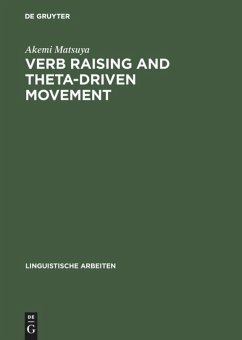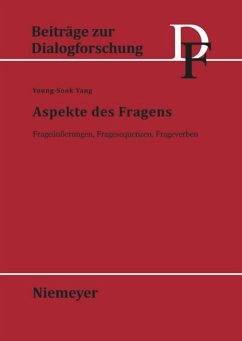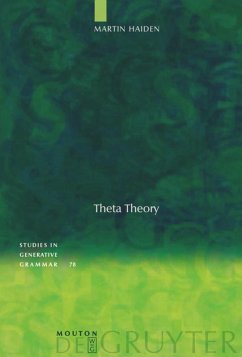
Verb Raising and Theta-Driven Movement
A Comparative Minimalist Approach with Particular Reference to Japanese

PAYBACK Punkte
0 °P sammeln!
Under the framework of the Minimalist Program, this book attempts to clarify that greedy movement in Japanese fulfills locality and is driven by checking theta roles as well as Case, categorial features, and so on as formal features. The findings are as follows: the Spec of TP and an uninterpretable [+V] feature make successive cyclic verb raising possible, thus producing a complex verb (Multiple Predicate Formation). MPF and the [+ Spec TP] parameter attribute nonobligatory controlled PRO in the subject position of the adjunct to checking the nominative Case at the Spec of TP within the adjun...
Under the framework of the Minimalist Program, this book attempts to clarify that greedy movement in Japanese fulfills locality and is driven by checking theta roles as well as Case, categorial features, and so on as formal features. The findings are as follows: the Spec of TP and an uninterpretable [+V] feature make successive cyclic verb raising possible, thus producing a complex verb (Multiple Predicate Formation). MPF and the [+ Spec TP] parameter attribute nonobligatory controlled PRO in the subject position of the adjunct to checking the nominative Case at the Spec of TP within the adjunct. Overt verb raising beyond the nonfinite clause boundary enables the long distance A-movement in the control constructions. The derivational difference among ni direct passives, ni indirect passives, and ni yotte direct passives is due to the three corresponding types of checking theta roles and Case. The impossibility of scrambling ni indirect passives is predicted by the exhaustion of the theta roles. The semantic difference between o-causatives and ni-causatives is caused by dative NP's checking Case and theta roles. No passives of noncoercive causatives are produced because of the exhaustion of theta roles at TP. The passivization in double object constructions are limited by the functions of dative markers in Case and theta role checking.













